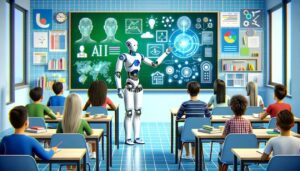Image From : linkedin.com
Artificial Intelligence (AI) is no longer a futuristic concept—it’s now a transformative force in American classrooms. From personalized learning platforms to AI-driven grading systems, education is undergoing a revolution that promises not just efficiency, but equity, engagement, and expanded access. As the U.S. education sector faces rising demand for innovation and outcomes, AI offers scalable solutions that are already reshaping how students learn and teachers teach.

Sourch : elearningindustry.com
The Rise of EdTech: Why AI Matters Now
With the U.S. edtech market projected to surpass $70 billion by 2027, AI is emerging as the core engine behind next-generation learning platforms. According to McKinsey, schools and universities that adopt AI solutions report enhanced student engagement, reduced administrative workload, and improved learning outcomes. AI tools are not only streamlining operations but also democratizing access to high-quality education.
Personalized Learning: Tailored Education at Scale
AI enables real-time analysis of student performance data to customize learning experiences. Platforms like Khan Academy’s AI tutor, powered by GPT-based models, are offering students personalized support, adjusting difficulty levels, and providing targeted feedback.
Impact: Students are 30–50% more likely to complete assignments when content is tailored to their individual learning styles.
AI-Powered Assessments: Efficiency and Fairness
Traditional grading can be inconsistent and time-consuming. AI tools such as Gradescope and Turnitin now assist educators by:
-
Auto-grading assignments
-
Detecting plagiarism
-
Offering performance analytics
This not only saves time but also reduces unconscious bias in assessments, making grading more transparent and equitable.

sourch : linkedin.com
Smart Classrooms and Virtual Assistants
Voice-activated AI tools like Google Assistant for Education and Microsoft Copilot are being used to automate attendance, answer student queries, and even facilitate classroom discussions. Interactive whiteboards and AI-integrated devices create immersive learning environments that keep students engaged.
Bridging Learning Gaps and Supporting Special Education
AI-driven applications are proving particularly valuable in special education and ESL (English as a Second Language) support. Tools like Lingvist and Otter.ai provide real-time transcription, translation, and comprehension assistance, enabling more inclusive classrooms.
Ethical Considerations and Challenges
While the promise of AI in education is massive, it raises important questions about:
-
Data privacy
-
Algorithmic bias
-
Dependence on technology over human connection
Educators and policymakers must ensure AI implementation is ethical, inclusive, and transparent.

sourch : medium.com
The Future of AI in Education: What’s Next?
Looking ahead, AI will likely evolve from a support tool into a collaborative learning partner. We can expect:
-
AI mentors for lifelong learning
-
Predictive analytics for student retention
-
Fully adaptive curricula tailored in real-time
Schools that embrace AI today are preparing students not just for exams—but for the future workforce.
Final Thoughts
Artificial Intelligence is not replacing teachers—it’s empowering them. With the right guardrails, AI can bridge educational divides, enhance learning outcomes, and ensure every student in America gets a chance to succeed in the digital age.









